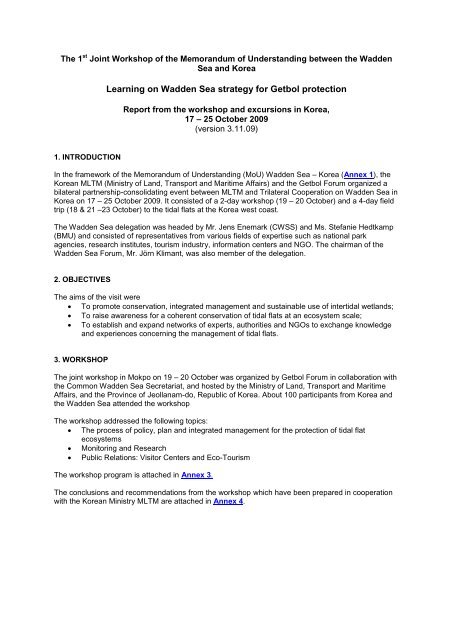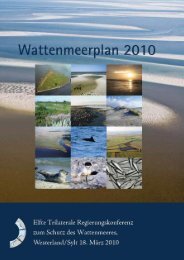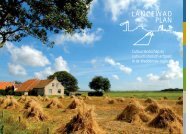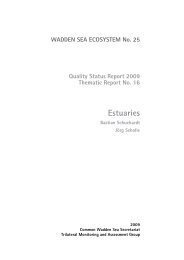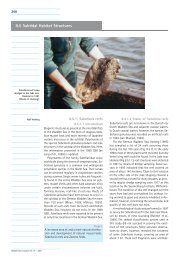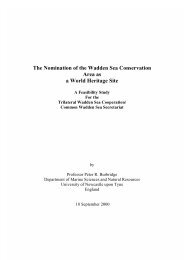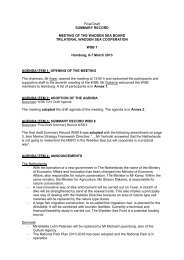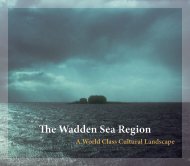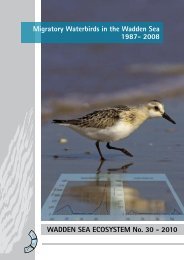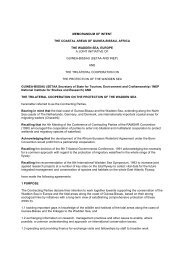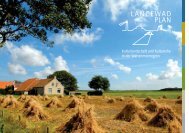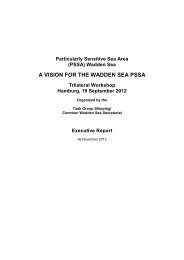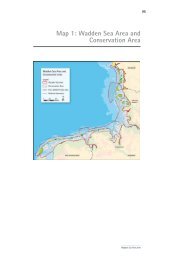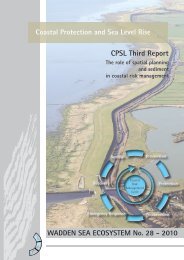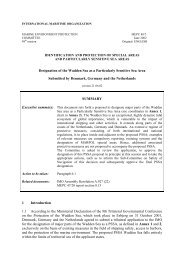Download workshop report - Trilateral Wadden Sea Cooperation
Download workshop report - Trilateral Wadden Sea Cooperation
Download workshop report - Trilateral Wadden Sea Cooperation
You also want an ePaper? Increase the reach of your titles
YUMPU automatically turns print PDFs into web optimized ePapers that Google loves.
The 1 st Joint Workshop of the Memorandum of Understanding between the <strong>Wadden</strong><br />
<strong>Sea</strong> and Korea<br />
Learning on <strong>Wadden</strong> <strong>Sea</strong> strategy for Getbol protection<br />
Report from the <strong>workshop</strong> and excursions in Korea,<br />
17 – 25 October 2009<br />
(version 3.11.09)<br />
1. INTRODUCTION<br />
In the framework of the Memorandum of Understanding (MoU) <strong>Wadden</strong> <strong>Sea</strong> – Korea (Annex 1), the<br />
Korean MLTM (Ministry of Land, Transport and Maritime Affairs) and the Getbol Forum organized a<br />
bilateral partnership-consolidating event between MLTM and <strong>Trilateral</strong> <strong>Cooperation</strong> on <strong>Wadden</strong> <strong>Sea</strong> in<br />
Korea on 17 – 25 October 2009. It consisted of a 2-day <strong>workshop</strong> (19 – 20 October) and a 4-day field<br />
trip (18 & 21 –23 October) to the tidal flats at the Korea west coast.<br />
The <strong>Wadden</strong> <strong>Sea</strong> delegation was headed by Mr. Jens Enemark (CWSS) and Ms. Stefanie Hedtkamp<br />
(BMU) and consisted of representatives from various fields of expertise such as national park<br />
agencies, research institutes, tourism industry, information centers and NGO. The chairman of the<br />
<strong>Wadden</strong> <strong>Sea</strong> Forum, Mr. Jörn Klimant, was also member of the delegation.<br />
2. OBJECTIVES<br />
The aims of the visit were<br />
To promote conservation, integrated management and sustainable use of intertidal wetlands;<br />
To raise awareness for a coherent conservation of tidal flats at an ecosystem scale;<br />
To establish and expand networks of experts, authorities and NGOs to exchange knowledge<br />
and experiences concerning the management of tidal flats.<br />
3. WORKSHOP<br />
The joint <strong>workshop</strong> in Mokpo on 19 – 20 October was organized by Getbol Forum in collaboration with<br />
the Common <strong>Wadden</strong> <strong>Sea</strong> Secretariat, and hosted by the Ministry of Land, Transport and Maritime<br />
Affairs, and the Province of Jeollanam-do, Republic of Korea. About 100 participants from Korea and<br />
the <strong>Wadden</strong> <strong>Sea</strong> attended the <strong>workshop</strong><br />
The <strong>workshop</strong> addressed the following topics:<br />
The process of policy, plan and integrated management for the protection of tidal flat<br />
ecosystems<br />
Monitoring and Research<br />
Public Relations: Visitor Centers and Eco-Tourism<br />
The <strong>workshop</strong> program is attached in Annex 3.<br />
The conclusions and recommendations from the <strong>workshop</strong> which have been prepared in cooperation<br />
with the Korean Ministry MLTM are attached in Annex 4.
Report from the MOU <strong>workshop</strong> and excursion in Korea, 17 – 25 October 2009 2<br />
4. EXCURSIONS<br />
KOEM, MLTM in cooperation with the Getbol Forum, Provinces, Counties and NGOs have organized<br />
a four-day excursion along the Korean west coast to experience the tidal flat ecosystem, its protection,<br />
the corresponded information and education activities, as well as eco-tourism programs.<br />
4.1 Excursion <strong>Sea</strong>mangeum and Mandol Tourism Village (18.10.09)<br />
The embankment of the <strong>Sea</strong>mangeum bay and estuary was concluded in 2006. It is the world largest<br />
reclamation project with an area of over 40,000 ha and the longest sea dike (33 km) in the world<br />
Although there was a great opposition against this project on local and regional level by fisherman and<br />
NGOs, the court gave green light to continue the project in.<br />
Because of problems with water quality, seawater is now let in through the sluice gates and the lake is<br />
kept brackish. The tidal range inside is very limited, certainly when compared with the 3 – 4 meters in<br />
the past. There are indications that since the closure the populations of some migratory birds have<br />
declined drastically. The project had severe impacts on the tidal flat ecosystem and the local fishery.<br />
Presently, there are discussions on how to develop the reclaimed area; recent proposals cover<br />
agricultural, industrial and recreational use.<br />
More information:<br />
http://www.waddensea-secretariat.org/news/publications/Wsnl/Wsnl99-1/wsnl99-1.html<br />
http://www.lighthouse-foundation.org/index.php?id=199&L=2.html%3F<br />
http://www.birdskorea.org/Habitats/Wetlands/Saemangeum/BK-HA-Saemangeum-Shorebird-<br />
Conservation-in-ROK.shtml<br />
The village of Mandol was introduced as an example how local communities can profit from tourism by<br />
providing infrastructure (info center, access to tidal flats) and qualified guided tours and recreational<br />
programs.<br />
4.2 Excursion to the tidal flats of Shinan county (21/22.10.09)<br />
On invitation of the county of Shinan, the <strong>Wadden</strong> <strong>Sea</strong> delegation experienced the “1004 islands”<br />
archipelago of the south-west coast which covers about 40% of the south Korean tidal flat area. After<br />
a boat tour through the archipelago, the residents of the island of Jeungdo prepared a regional “slow<br />
food” promoting the recent designation of the island as UNESCO Man and Biosphere Reserve and as<br />
“Slow City” regarding a sustainable tourism.<br />
The delegation visited the Taepyoeng salt farm and the adjacent restored salt marsh area with visitor<br />
guidance system and the tidal flat information center. Size, Number of staf, visitors<br />
The fauna of flora the Korean tidal flats was experienced during a 2-hour field trip on the Juengdo<br />
island.<br />
4.2 Excursion to the tidal flats of Muan county (22.10.09)<br />
The visit of the Muan info center which is directly located adjacent to the tidal flat areas of the island of<br />
Jellanamdo was a highlight of the tour. There were boardwalks over the flat and a salt marsh<br />
development was started, using brushwood groins The tidal flat exhibition which included also cultural<br />
aspects has recently been established. The center is planned to be opened in May 2010.<br />
4.3 Excursion to the island of Gangwha (23.10.09)<br />
On invitation of the county of Gangwha, the <strong>Wadden</strong> <strong>Sea</strong> delegation visited the Han river estuary<br />
(demarking the border to North Korea), the cultural history museum and the tidal flat center at the<br />
south cost of the island.<br />
The International <strong>Wadden</strong> <strong>Sea</strong> School (IWSS) was introduced by Anja Szczensinski to about 20<br />
Korean colleagues involved in tidal flat education. There was a great interest to learn about the IWSS<br />
network approach, as well as getting practical information from the Dutch, German and Danish info<br />
centers. A further exchange of experiences with <strong>Wadden</strong> <strong>Sea</strong> centers on information and education<br />
was welcomed e.g. by conducting training courses.
Report from the MOU <strong>workshop</strong> and excursion in Korea, 17 – 25 October 2009 3<br />
5. FUTURE ACTIVITIES<br />
As result of the <strong>workshop</strong> and the excursions, a number of follow-up activities were identified by the<br />
<strong>Wadden</strong> <strong>Sea</strong> delegation and the Korean colleagues at a final meeting on 24 October 2009 which<br />
could be implemented in the framework of the MoU.<br />
5.1 Capacity building and fields of cooperation<br />
On proposal by the Korean MLTM and Getbol Forum, it was agreed focusing on capacity building<br />
activities especially with regard to monitoring (development of monitoring and assessment concepts,<br />
scientific networks, monitoring methods) and information / education (practical courses, training of<br />
guides, NGOs and teachers) These activities should be carried out in Korea in order to involve as<br />
much participants as possible from the Korean side. A budget for these activities can be provided via<br />
the KEOM and funding from ongoing monitoring projects at the universities.<br />
In addition, more knowledge on structure and function of <strong>Wadden</strong> <strong>Sea</strong> management and policy was of<br />
interest for the Korean side, in order support capacity building and awareness for policy makers. The<br />
establishment of “pilot regions” was considered as a possibility to get experience with new<br />
management approaches. As a first step, a <strong>workshop</strong> on policy and management will be organized in<br />
the <strong>Wadden</strong> <strong>Sea</strong> in connection with the visit of a Korean delegation at the Sylt Conference.<br />
5.2 TGC Sylt 2010<br />
The <strong>Trilateral</strong> Governmental Conference on Sylt in March 2010 would be an opportunity to start these<br />
activities. A participation of a Korean delegation at the TGC should be organized. In addition,<br />
information exchange events (site visits, <strong>workshop</strong>s) with the respective experts should be organized<br />
before and/or after the TGC in Sylt in cooperation with the National Park Administration and NP<br />
Partners, NGOs, and Denmark.<br />
5.3 Joint <strong>workshop</strong>s and coordination<br />
Future joint <strong>workshop</strong>s and activities should be combined as far as possible with existing trilateral<br />
events such as the Scientific <strong>Wadden</strong> <strong>Sea</strong> Symposia or <strong>Trilateral</strong> Governmental Conferences. In<br />
regular intervals, e.g. every three years, follow-up MOU <strong>workshop</strong>s should be organized in Korea to<br />
take stock of the progress achieved so far.<br />
The delegation agreed that all initiatives and activities between partners from <strong>Wadden</strong> <strong>Sea</strong> and Korea<br />
should be communicated via the MOU liaison officers, Mr. Harald Marencic (CWSS) and Mr.Chulhwan<br />
Koh (Getbol Forum) who serve as a focal point for communication between the <strong>Trilateral</strong><br />
<strong>Cooperation</strong>, Korea, and all involved parties (MoU § 2.2).<br />
A more detailed implementation plan for the proposed activities should be prepared by the lead<br />
persons until 1 December 2009.
Report from the MOU <strong>workshop</strong> and excursion in Korea, 17 – 25 October 2009 4<br />
Table 1: Overview of proposed follow-up activities<br />
Ideas for implementation (what, who, when)<br />
A. Information and education What Lead<br />
persons<br />
When<br />
A 1. Eco-Tourism<br />
Visit of Korean tourism Höfinghoff,<br />
development of strategies for ecotourism<br />
experts to exchange CWSS,<br />
in tidal flats,<br />
information on tourism and WHS<br />
training of information und tourist marketing including World Tourism<br />
managers<br />
Heritage Site Tourism Group<br />
cooperation between information Strategy<br />
centers<br />
A 2. Information, environmental education and Participation of guides from Szczesinski<br />
awareness<br />
Korean centers in <strong>Wadden</strong> (IWSS<br />
cooperation of IWSS and <strong>Wadden</strong> <strong>Sea</strong> training courses and network) in<br />
<strong>Sea</strong> the Korean visitor centers center programmes, collaboration<br />
development of material for students<br />
with Krol and<br />
and school classes (exchange with<br />
Jessen<br />
International <strong>Wadden</strong> <strong>Sea</strong> School)<br />
translation of IWSS material,<br />
<strong>workshop</strong>s on environmental<br />
education<br />
B. Policy and Management<br />
B.1. Restoration of wetlands<br />
No specific activities<br />
B.2. Development of integrated strategies<br />
protection strategies for sustainable<br />
development and wise use<br />
integrated coastal zone<br />
management<br />
development of scientific based<br />
guiding principles, targets and<br />
assessment tools<br />
C. Monitoring and research<br />
development of monitoring methods<br />
including data handling systems and<br />
concomitant research,<br />
operational monitoring with remote<br />
sensing techniques<br />
Subtidal monitoring<br />
Ecological research projects (e.g.<br />
<strong>Wadden</strong> Academy)<br />
planned<br />
1, Promotion to establish a<br />
“pilot region” at the Korean<br />
Getbol for integrated policy<br />
and management<br />
2. Initiate cooperation on<br />
regional level: County<br />
Ganghwa – Landkreis<br />
Aurich<br />
1. Monitoring <strong>workshop</strong><br />
with Korean experts<br />
methods, assessment, and<br />
<strong>report</strong>ing<br />
2. Benthos <strong>workshop</strong> (incl.<br />
field work)<br />
3. Scientific comparison of<br />
tidal flat ecology<br />
1. WSF /<br />
CWSS<br />
2 Farke<br />
1. Marencic /<br />
TMAG<br />
2. Farke /<br />
CWSS<br />
3. Dankers /<br />
Farke /<br />
CWSS<br />
March<br />
2010, two<br />
day trip SH<br />
September,<br />
2010<br />
1. March<br />
2010<br />
2 until<br />
March 2010<br />
1. 2010<br />
2. 2010<br />
3. to be<br />
defined<br />
Costs<br />
Accommodation<br />
transportation<br />
Cost for courses to<br />
be calculated,<br />
accommodation,<br />
transportation (by<br />
Korean Partner)<br />
1. Accommodation<br />
transportation<br />
2. To be covered by<br />
regional partners<br />
1. Accommodation<br />
transportation<br />
(by Korean Partner)<br />
2. Accommodation<br />
transportation<br />
(by Korean Partner)<br />
3. to be done
Report from the MOU <strong>workshop</strong> and excursion in Korea, 17 – 25 October 2009 5<br />
Annex 1<br />
Memorandum of Understanding<br />
on Mutual <strong>Cooperation</strong><br />
for the Purpose of<br />
Conservation and Management of<br />
Tidal Flat Ecosystems<br />
THE MINISTRY OF LAND, TRANSPORT AND MARITIME AFFAIRS OF THE REPUBLIC OF<br />
KOREA<br />
AND<br />
THE TRILATERAL COOPERATION ON THE PROTECTION OF<br />
THE WADDEN SEA<br />
Hereinafter referred to as the “Participants”<br />
RECOGNIZE that the tidal flats of the <strong>Wadden</strong> <strong>Sea</strong> in The Netherlands, Germany and Denmark and<br />
Korea constitute the largest tidal coastal flats world wide with high ecological and socio-economic<br />
values, a high biodiversity and a global importance for the migration of bird populations;<br />
NOTE that tidal flats have endured a significant danger of loss caused by, amongst others but not<br />
limited to, land-reclamation over the past few centuries, and climate change including sea level rise;<br />
BEAR IN MIND that the Participants have gained an extensive and unique knowledge of the ecology<br />
of tidal flat ecosystems and shared a significant interest in the conservation, management and,<br />
sustainable use of tidal flats;<br />
RECALL the conclusions from the international symposium on intertidal wetlands in Changwon, 27th<br />
October 2008, jointly organized by Getbol Forum, the Common <strong>Wadden</strong> <strong>Sea</strong> Secretariat, Birdlife<br />
International and the Yellow <strong>Sea</strong> Project (UNDP/GEF YSLME, WWF/KORDI), which have been<br />
attached as Annex 2 to the Ramsar Resolution 22 at the 10th Meeting of the Conferences of<br />
Participants of the Ramsar Convention (2008);<br />
RECOGNIZE the recommendations of the 10 th International Scientific Symposium in Groningen, 2000,<br />
“to initiate a co-operation with The Republic of Korea to foster the transfer of knowledge and<br />
experience in the fields of tidal flat ecology and coastal zone management as gained in the European<br />
<strong>Wadden</strong> <strong>Sea</strong> area”;<br />
NOTE the existing relationships between Korea and the National Park Schleswig-Holstein, the GKSS<br />
Research Center Geesthacht and the Alfred-Wegener-Institute for Polar and Marine Research, which<br />
were established in the mid 1990s;<br />
RECALL that the 4th Meeting of the Conference of Parties of the Ramsar Convention (1990)<br />
encouraged the cooperation of Parties to enter into bilateral and multilateral cooperation to protect<br />
wetlands and migratory species of waterfowl;<br />
RECOGNIZE that international cooperation for advanced conservation and management of tidal flats<br />
is desirable between the Participants and others such as the Parties to the Ramsar Convention;<br />
ARE CONVINCED that the exchange of experiences and knowledge is necessary based on mutual<br />
respect and understanding of cultural, traditional and socio-economical differences between the<br />
Participants;<br />
DESIRE to strengthen communication and cooperation between the Participants.
Report from the MOU <strong>workshop</strong> and excursion in Korea, 17 – 25 October 2009 6<br />
Have reached the following understanding:<br />
1. PURPOSE<br />
The Participants intend<br />
1.1 To work together for conservation, restoration and sustainable use of intertidal wetlands;<br />
1.2 To raise awareness for a coherent conservation of tidal flats at an ecosystem scale;<br />
1.3 To establish and expand networks of experts, authorities and NGOs to exchange<br />
knowledge and experiences concerning the management of tidal flats.<br />
2. ACTION FOR ARRANGEMENTS<br />
The Participants intend<br />
2.1 To share knowledge and experiences of conservation, restoration and sustainable use of<br />
tidal flats;<br />
2.2 To designate liaison officers to serve as a focal point for communication between the<br />
Participants;<br />
2.3 To exchange experts to carry out specific projects and to provide finances for these<br />
activities, as appropriate;<br />
2.4 To hold educational and academic joint <strong>workshop</strong>s and symposia and to invite<br />
representatives of the Participants to <strong>workshop</strong>s and conferences in relevant fields;<br />
2.5 To initiate joint scientific and management projects where necessary and possible;<br />
2.6 To inform the Secretariat of the Ramsar Convention of the activities of cooperation<br />
between the Participants in order to expand international cooperation.<br />
3. PRINCIPLES<br />
The Participants share the view that:<br />
3.1 The Participants should respect each Participant‟s laws and regulations and no actions<br />
arising from the Memorandum will override the statutory duties or responsibilities of the<br />
Participants;<br />
3.2 The Participants should seek to achieve mutual cooperation and assistance respecting<br />
each other‟s culture, history, tradition, and heritage of tidal flats;<br />
3.3 In case of the <strong>Cooperation</strong> on the Protection of the <strong>Wadden</strong> <strong>Sea</strong> all financial implications<br />
will be covered by the existing budget;<br />
3.4 The cooperation under this Memorandum of Understanding should start when signed by<br />
the respective Representatives from each Participant;<br />
3.5 A Participant may request to amend or terminate this Memorandum of Understanding<br />
with a 90 days‟ notice to the other Participants.<br />
Signed in Wilhelmshaven, Germany, 30 March 2009<br />
FOR THE MINISTRY OF LAND, TRANSPORT AND MARITIME AFFAIRS<br />
OF THE REPUBLIC OF KOREA<br />
Mr. Byoung-Gyu Seo, Ministry of Land, Transport and Maritime Affairs of the Republic of<br />
Korea<br />
FOR THE TRILATERAL COOPERATION ON THE PROTECTION OF THE WADDEN SEA<br />
Ms. Elsa Nickel, Federal Ministry for the Environment, Nature Conservation and Nuclear<br />
Safety of the Federal Republic of Germany
Report from the MOU <strong>workshop</strong> and excursion in Korea, 17 – 25 October 2009 7<br />
Annex 2<br />
Time schedule 17 – 25 October<br />
Oct 17: Arrival at Incheon (Seoul) International Airport,<br />
Oct 18: Travel by Bus to Saemangeum and other Getbol to Mokpo<br />
Oct 19 & 20: Two-day <strong>workshop</strong> (see Annex 4),<br />
Oct 21: Excursion to Shinan Getbol (visitor center, salt pan, mudflat excursion)<br />
Oct 22: Excursion to Muan Getbol (visitor center and others),<br />
Oct 23: Excursion to Ganghwa island (Han river estuary, tidal flat center),<br />
Oct 24: Final meeting with Getbol Forum and MLTM for future activity of MOU,<br />
Oct 25: Departure from Incheon International Airport
Report from the MOU <strong>workshop</strong> and excursion in Korea, 17 – 25 October 2009 8<br />
Annex 3 Workshop Program, Maritime Museum, Mokpo, 19 – 20 October 2009<br />
Day 1: 19 th October, 2009<br />
11:30-13:00 Press Conference, Registration & Lunch<br />
13:00-13:30 Opening of the <strong>workshop</strong> and Welcome addresses<br />
Session 1: The process of Policy, Plan and Implementation for the Protection of <strong>Wadden</strong> <strong>Sea</strong><br />
Chairs: Harald MARENCIC, CWSS, and Jong Geel JE, KORDI / City & Nature Institute<br />
13:40-14:20 <strong>Wadden</strong> <strong>Sea</strong> <strong>Cooperation</strong>: History and Achievements<br />
Jens ENEMARK, Common <strong>Wadden</strong> <strong>Sea</strong> Secretariat (CWSS)<br />
14:20-15:00 The concept and success of the <strong>Wadden</strong> <strong>Sea</strong> Forum<br />
Joern KLIMANT, Province of Dithmarschen / Chairman <strong>Wadden</strong> <strong>Sea</strong> Forum<br />
15:00-15:40 Processes of Policy Formation & Implementation: Lower Saxon and National Park<br />
Hubert FARKE, National Park Lower Saxon <strong>Wadden</strong> <strong>Sea</strong><br />
15:40-16:00 Coffee break<br />
16:00-16:40 Integrated management approach and stakeholder involvement in the <strong>Wadden</strong> <strong>Sea</strong><br />
Region<br />
Manfred VOLLMER, <strong>Wadden</strong> <strong>Sea</strong> Forum<br />
16:40-17:00 National and International Efforts: Korean & East Asian Regional <strong>Sea</strong>s<br />
Chul-Hwan KOH, SNU<br />
17:00-17:20 Coffee break<br />
17:20-18:00 Discussion<br />
Day 2: 20 th October, 2009<br />
Session 2: Monitoring and Case Studies<br />
Chairs: Hyun-Sig LIM, Mokpo University & Hubert FARKE, NP of Lower Saxon<br />
09:00-09:40 Monitoring Guidebook and Structure of Monitoring organization<br />
Harald MARENCIC, CWSS<br />
09:40-10:20 Structure of <strong>Wadden</strong> <strong>Sea</strong> Research and WS Symposium and its Relation to the Policy<br />
Formation<br />
Norbert DANKERS, Institute of Marine and Ecological Research (IMARES)<br />
10:20-10:30 Coffee Break<br />
10:30-11:10 Monitoring of Migratory Birds: Structure and achievements<br />
Mark Van ROOMEN, SOVON/Joint Monitoring Group of Migratory Birds (JMMB)<br />
11:10-11:30 Monitoring of Migratory Birds: Structure and achievements- The Korean experience<br />
Yong-Ki Ju, Chonbuk University<br />
11:30-11:50 Korean Getbol Monitoring and its Relation to the Policy Formation<br />
Seung-Soo CHUN, Chonnam University & Hyun-Sig LIM, Mokpo University<br />
11:50-12:30 Session Discussions<br />
12:30-14:00 Lunch
Report from the MOU <strong>workshop</strong> and excursion in Korea, 17 – 25 October 2009 9<br />
Session 3: Public Relations: Visitor Centers and Eco-Tourism<br />
Chairs: Anja SZCZESINKI, IWSS & Dong-Uk Han, PGA Korea<br />
14:00-14:35 International <strong>Wadden</strong> <strong>Sea</strong> School<br />
Anja SZCZESINKI, International <strong>Wadden</strong> <strong>Sea</strong> School (IWSS), Husum<br />
14.40-15:10 Regional and international cooperation in nature education in a <strong>Wadden</strong> <strong>Sea</strong> Area<br />
Søren Rask JESSEN<br />
15:10-15:45 Tourism and Marketing in the <strong>Wadden</strong> <strong>Sea</strong><br />
Constanze HOEFINGHOFF, Nordsee-Tourismus-Service GmbH, Husum<br />
15:45-16:20 Information and education in the <strong>Wadden</strong> <strong>Sea</strong>: Experiences from the visitor center on<br />
the island of Ameland,<br />
Johan KROL, Visitor Center, Ameland<br />
16:20-16:30 Coffee break<br />
16:30-16:50 Two Korean Eco-Tourism<br />
Jong Geel JE, KORDI / City & Nature Institute<br />
16:50-17:10 Making National Implementation Plan for CEPA, Korea<br />
Dong-Uk HAN, PGA Korea<br />
17:10-17:30 The Korean Visitor Centers<br />
Ji-Young JANG, Eco-Horizon Institute & Young-Up YOO, Jeungdo Tidal Flat Ecological<br />
Exhibition Center<br />
17:30-17:40 Coffee break<br />
Session 4: Workshop Wrap Up and Discussions<br />
Chairs: Jens ENEMARK, CWSS & Chul-Hwan KOH, Getbol Forum Korea<br />
17:40-18:40 Wrap Up and Hearing for the Future <strong>Cooperation</strong> between <strong>Wadden</strong> <strong>Sea</strong> and Korea
Report from the MOU <strong>workshop</strong> and excursion in Korea, 17 – 25 October 2009 10<br />
Annex 4<br />
The 1 st Joint Workshop of the Memorandum of Understanding between the <strong>Wadden</strong> <strong>Sea</strong> and Korea<br />
Learning on <strong>Wadden</strong> <strong>Sea</strong> strategy for Getbol protection<br />
Mokpo, Republic of Korea, 19 th – 20 th October 2009<br />
Workshop Results<br />
The first joint <strong>workshop</strong> held in the framework of the MoU <strong>Wadden</strong> <strong>Sea</strong> – Korea was held on 19 – 20<br />
October in Mokpo, Korea. The symposium was organised by KEOM and the Getbol („tidal flats‟)<br />
Forum, Republic of Korea in collaboration with the Common <strong>Wadden</strong> <strong>Sea</strong> Secretariat. The <strong>workshop</strong><br />
was hosted by the Ministry of Land, Transport and Maritime Affairs, and the Province of Jeollanam-do,<br />
Republic of Korea. Over 100 participants from Korea and the <strong>Wadden</strong> <strong>Sea</strong> (The Netherlands,<br />
Germany and Denmark) attended the <strong>workshop</strong>.<br />
The aim of the <strong>workshop</strong> was<br />
To promote conservation, restoration and sustainable use of intertidal wetlands;<br />
To raise awareness for a coherent conservation of tidal flats at an ecosystem scale;<br />
To establish and expand networks of experts, authorities and NGOs to exchange knowledge<br />
and experiences concerning the management of tidal flats.<br />
The participants welcomed the <strong>workshop</strong> as an excellent opportunity to discuss common issues of<br />
conservation, restoration and sustainable use, as well as information and awareness raising of our<br />
precious Getbol and <strong>Wadden</strong> <strong>Sea</strong> and to consider further working fields.<br />
General conclusions:<br />
1. The tidal flat ecosystems of Korea and the <strong>Wadden</strong> <strong>Sea</strong> are of global importance for biodiversity<br />
conservation and natural processes biological production, with outstanding socio-economic,<br />
cultural and landscape values, and provide benefits for the people. At the same time, intertidal<br />
mudflats are facing a multitude of threats.<br />
2. The Getbol Forum has to play a critical role in providing valuable information and involvement of<br />
society in Korea.<br />
3. The designation of marine protected areas at the Korean tidal flats has progressed<br />
and will be continued.<br />
4. The experiences from the <strong>Wadden</strong> <strong>Sea</strong> <strong>Cooperation</strong> have shown the importance of a common<br />
vision for conservation and sustainable use of the coastal area, a regular and harmonized<br />
monitoring and assessment, and involvement of a larger community on a structural and<br />
committed basis in mutual trust and respect.<br />
5. The tidal flat ecosystems of Korea and the <strong>Wadden</strong> <strong>Sea</strong> are similar but have different<br />
management systems:<br />
The <strong>Wadden</strong> <strong>Sea</strong> has a long history of nature conservation whereas in Korea management<br />
aims for tidal flats has changed to conservation since the Wetland Conservation Act was<br />
enacted in 1999.<br />
<strong>Wadden</strong> <strong>Sea</strong> conservation is based on an ecosystem approach and wise-use whereas tidal<br />
flat conservation in Korea is confined to smaller areas due to the lack of mutual agreements.<br />
In the <strong>Wadden</strong> <strong>Sea</strong>, the main goal of policy making and management is nature conservation<br />
based on scientific knowledge with, whereas management of Korean Getbol had been<br />
influenced mainly by local and short-term economic interest.<br />
6. There is a lack of an overall strategy for information and awareness activities for tidal flats in<br />
Korea in particular with regard to developing a master plan for Getbol centres.<br />
7. There is a need to enhance awareness on all levels to increase support for the cooperation on<br />
the protection of the tidal flat ecosystem.
Report from the MOU <strong>workshop</strong> and excursion in Korea, 17 – 25 October 2009 11<br />
The <strong>workshop</strong> participants having heard the presentations from the <strong>Wadden</strong> <strong>Sea</strong> and Korea<br />
identified the following fields of future cooperation:<br />
1. Development of a management approach for the Korean Getbol considering the experience,<br />
history and structure of the <strong>Wadden</strong> <strong>Sea</strong> management strategy, aiming at the long-term goal to<br />
manage the Korean Getbol at an ecosystem level.<br />
2. Development of monitoring strategies and exchange of data in particular with regard to<br />
migratory birds and, in particular, establishment of a monitoring group of Korean experts to<br />
experience the <strong>Wadden</strong> <strong>Sea</strong> monitoring and data management.<br />
3. Developments of strategies with regard to sea level rise, adaptation to climate change, invasive<br />
species and sediment processes.<br />
4. Awareness and information:<br />
Development of on an overall strategy / master plan for tidal flat information centres including<br />
guidelines for regional implementation and training / qualification of staff (e.g. by exchange of<br />
staff between Korea and <strong>Wadden</strong> <strong>Sea</strong> on the site level),<br />
Exchange of ideas for the development of material for students and school classes,<br />
Translation of IWSS material for education purposes on Korean Getbol,<br />
Joint <strong>workshop</strong> on CEPA (communication, education, participation and awareness).<br />
5. Development of overall strategies for sustainable tourism for tidal flats by exchanging<br />
experience from new concept of eco-tourism in Korea and the long tradition of nature tourism in<br />
the <strong>Wadden</strong> <strong>Sea</strong> which has benefited from nature conservation and which is now the main<br />
economic factor in the region.<br />
6. Enhancement of knowledge of the tidal flat ecosystem in Korea in order to establish a scientific<br />
basis for monitoring, assessment and management.<br />
7. Enhance of awareness of tidal flat ecosystem protection in Korea for policy makers on state,<br />
provincial and regional level.<br />
The <strong>workshop</strong> participants recommended organizing regular (e.g. bi-annual) follow-up <strong>workshop</strong>s in<br />
the framework of the MoU addressing specific themes.


